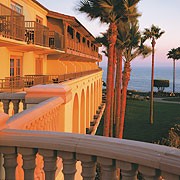With both upscale leisure and corporate travel booming, it’s little wonder that luxury hotels are enjoying the ultimate sellers’ market these days. While all types of hotels are experiencing record occupancies and room rates, it’s the most-deluxe properties that are in position to drive the hardest bargains.
At the same time, hotel companies are redefining the luxury concept as they strive to please a new generation of upscale guests whose tastes veer away from anything too stuffy or traditional. But a hipper, more casual style doesn’t mean a lowering of standards; in fact, services and amenities at luxury hotels are more varied and personalized than ever before.
Riding High
Just how good is life for luxury hotels these days? According to figures from Smith Travel Research in Hendersonville, Tenn., the top-tier hotel brands, which include Four Seasons, Ritz-Carlton, Loews, Fairmont, St. Regis, Waldorf=Astoria, Rosewood, and W, enjoyed the highest average occupancy level, 71.4 percent, of any hotel segment last year. They also racked up the highest occupancy increase, 2.3 percent, over 2005.
Hotels in the top-tier category also posted the largest gain in average daily room rates last year, increasing by 9 percent over 2005 to a whopping $271.90. By contrast, hotels in the next highest category, brands that include Sheraton, Hilton, Marriott, Hyatt and Westin, posted average room rates of $151.07, a 4 percent increase over 2005.
“So the difference between staying at a luxury hotel and a hotel in the next highest category is greater than ever before—you’re looking at a difference of over $120 a night,” says Duane Vinson, vice president at Smith Travel Research. “The increase in occupancies is giving luxury properties the ability to push up rates to new heights.”
Why are the top-tier hotels so far ahead of the pack? According to Vinson, the fact that corporate business, including meetings, has rebounded in recent years is a major factor.
“Luxury is a traditionally strong category,” he says. “High-end leisure business did not fall off during the economic slump the way meetings and conventions did. So now that group business has bounced back, it’s pushed things up further.”
Hotel industry consultants also say that demand from baby boomers, many of whom are starting to retire with considerable financial resources, is also responsible.
“This is a generation who wants to be pampered and they will pay for the very best,” says Steven Hennis, president of Hospitium, a consulting and research firm in Arvada, Colo., that specializes in the luxury and upscale segments of the lodging industry. “They have much more disposable income than their parents did and they are far less frugal.”
Short Supply
While demand for luxury is expected to remain strong in the foreseeable future, there is little evidence that the supply of new luxury hotels and resorts will keep pace. While hotel companies are eager to acquire existing hotels and upgrade them, the high cost of constructing a new luxury property is still a barrier for new development.
“Part of the reason that luxury hotels tend to be recession-proof is that there are relatively few of them. They are a very small segment of the market,” says Bruce Ford, vice president of Econometrics, a Portsmouth, N.H.-based company that tracks hotel development trends.
With funding difficult to secure for full-service properties, almost all luxury hotels and resorts now under development in the U.S, are part of mixed-use projects that include condos and other types of residential units. Developers are able to finance these projects with money put up by the residential buyers.
“You really can’t pencil a luxury hotel deal these days unless there is a residential component,” Hennis says. “This means that the hotel portion of the project is kept fairly small. So room counts are not growing fast and supply is kept down.”
With new construction limited, investors are paying record prices to acquire luxury hotels and resorts, another reason why room rates are likely to remain in the stratosphere. According to figures from Hospitium, the recent sales of Hawaii’s Four Seasons Hualalai, San Diego’s Hotel del Coronado and New York’s W New York Union Square all commanded well over $1 million per guest room.
For meeting planners, the end result is that anyone trying to book a meeting at a high-end hotel or resort is not likely to find much room for bargaining.
“Luxury hotels still want meetings, but they are less of a priority than they were,” says Bjorn Hanson, practice leader for the hospitality division of PricewaterhouseCoopers in New York. “The individual traveler will pay a higher rate and doesn’t need a block of rooms. At the same time, the hotels are charging more for meeting room rental, food and beverage and all the extras.”
Lee Roberts, director of client services for Dittman Incentive Marketing in Edison, N.J., is among planners who are finding that upscale hotels are playing hard ball. “Rates are absolutely going through the roof now,” she says. “Hotels are not negotiating the way they should. One day the pendulum will swing back in our favor and they should keep this in mind.”
Luxury Redefined
Another trend in the luxury hotel sector is a growing number of upscale properties aimed at a new generation of guests who have their own ideas of what luxury should be.
“What has happened is that there are now two distinct styles of luxury—the new and hip and the older and more traditional,” Ford says. “They attract very different types of guests. If I’m a 25-year-old millionaire business traveler, the chances are I don’t want to stay at a classically designed hotel filled with antiques. That might be right for my dad, but it’s not my style.”
Ford adds that the emergence of young, upscale corporate travelers is fueling the success of W Hotels and other newer luxury brands. “People are retiring earlier and the traveling public is getting younger,” he says. “There are many young people with lots of money and these new hotels are designed for them. W has really spoken to this market.”
At the same time, the emergence of what some in the hotel industry call “lifestyle hotels” has also widened the scope of luxury style. These properties range all the way from hip urban boutique hotels to secluded resorts with New Age-oriented spa programs dedicated to physical and spiritual well-being.
While not all lifestyle hotels are in the five-star category, Los Angeles-based attorney and consultant Jim Butler, chairman of JMBM Global Hospitality Group, observes that they often appeal to people who can easily afford to stay at a Ritz-Carlton or Four Seasons property. He adds that they have had an enormous impact on the way hotels are designed, resulting in more properties that reflect the characteristics of their locations.
“Twenty years ago, most new hotel design was very generic, one big box was just like another,” he says. “And you had resorts with acres of marble being built in places like Hawaii. Now there is more of a sense of place at many upscale hotels and resorts.”
Going Casual
Hotel industry consultants also note that luxury hotels across the board are becoming more informal in both design and atmosphere, seen in ways that range from more liberal dress codes to lobbies with cozy seating areas and fireplaces.
“The trend to appeal to a younger demographic is happening throughout the industry, even at Ritz-Carltons and other more traditional hotels,” says Bruce Baltin, senior vice president at PKF Consulting in Los Angeles. “Hotels are adjusting to the more casual way society is now. Things are less oriented toward a world of ladies and gentlemen.”
Despite this, service levels have not dropped; in fact, services and amenities are more fine-tuned than ever.
“A big trend that I see is how services are much more customized,” Roberts says. “You’re asked what kind of pillow you want or even what kind of aromatherapy you want in the room.”
Also noting the trend, Baltin says that database technology has made it easier for hotels to provide guests with exactly what they want.
“It used to be that all the welcome amenities in the rooms were the same, but now the hotels can more easily track the preferences of their guests,” he says. “They know what kind of tea you want.”







